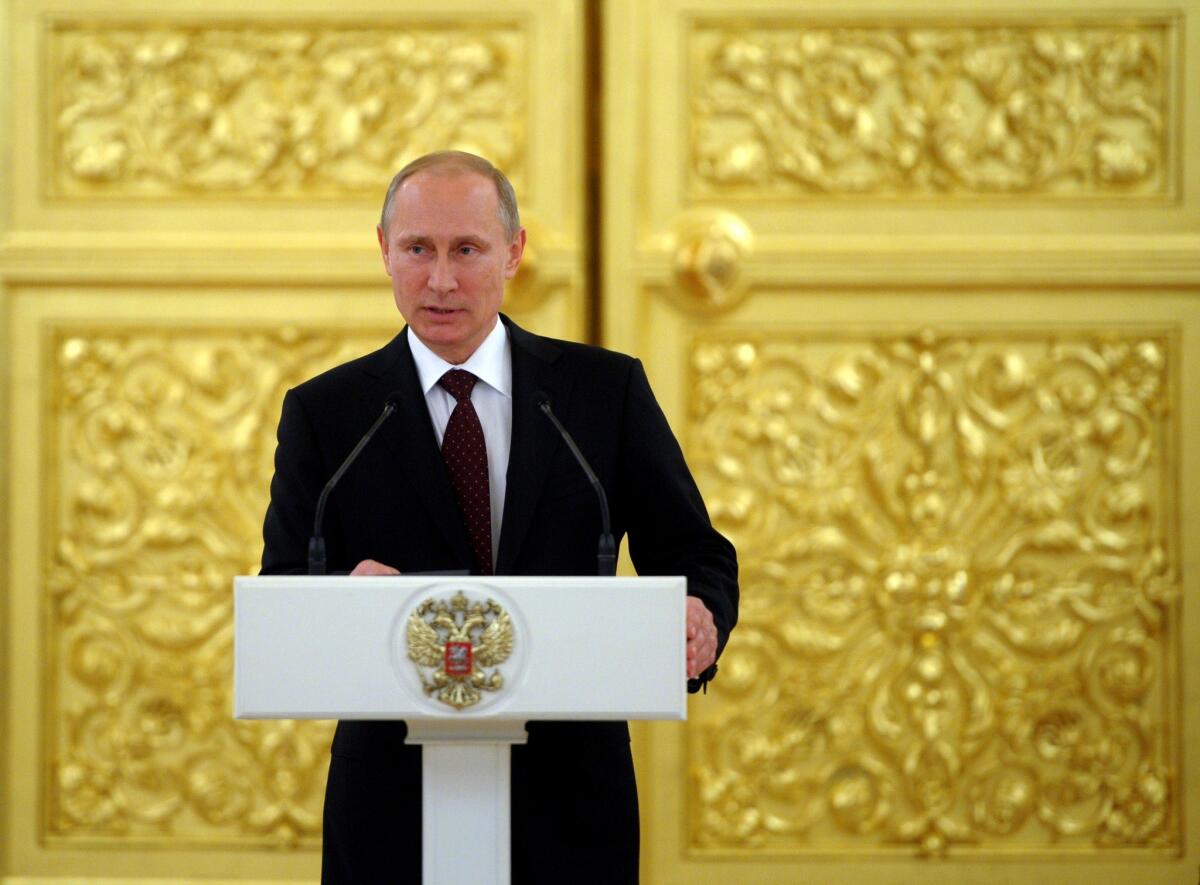Vladimir Putin, master player

- Share via
Let us now praise Vladimir Putin.
Yes, Russia’s president is a cold-hearted autocrat. And yes, he rules through a network of nasty oligarchs bent on squeezing profit from their country’s oil riches. If he covets a piece of territory, he’s liable to try to grab it.
But he’s not a madman. Putin has played an old-fashioned game of international brinkmanship masterfully — and so far, he’s coming out ahead.
The Russian president took Ukraine to the brink of war, but then, remarkably, he backed off.
His hands-off attitude toward Ukraine’s presidential election on Sunday, and his willingness to negotiate with Ukraine’s newly elected Petro Poroshenko, doesn’t mean the crisis is over; far from it.
On Monday, for example, Ukrainian troops fought a pitched battle with pro-Russian guerrillas at the airport in Donetsk, the eastern Ukrainian city seized by separatists; about 50 were reported killed. But notice what didn’t happen: The Red Army didn’t swoop in from Russia to rescue its beleaguered clients.
And that means the struggle over Ukraine isn’t going to escalate toward military confrontation between Russia and the West. Instead of a global flash point, it’s now merely one of several local wrangles in the territory of the former Soviet Union. And, for the time being, the U.S. and its European allies are content to leave it that way.
Here’s the score card: Putin has pocketed Crimea, the first territory in Europe to be seized by force since World War II. (On paper, the United States and the European Union are still demanding that he give the peninsula back to Ukraine, but in private, their leaders concede that’s unlikely to happen.) He has forced the European Union to put the brakes on Ukraine’s progress toward membership in the Western economic club. He has kept most of Russia’s business with the West intact and signed a big new natural gas deal with China. Now all he has to do is wait for Western attention to Ukraine’s travails to wane, as it probably will.
“Putin has been watching carefully how people react,” Fiona Hill of the Brookings Institution, a longtime Putin-watcher, told me. “By pulling back over the elections, he created himself a breathing space.... Now everyone is saying, ‘We must deal with Russia.’ But that puts Russia in the driver’s seat.
“Even Poroshenko is saying it’s time for normalization with Moscow,” she noted. “He knows who’s going to call the shots over Ukraine’s future: not Brussels, not Washington. It’s Moscow.”
And Putin won’t apologize for that. He considers Ukraine part of what he calls “the post-Soviet space,” meaning Russia’s rightful sphere of influence. He told foreign journalists last week he acted against Ukraine for defensive reasons, because Kiev’s moves toward membership in the European Union and NATO “threaten our interests.”
“There are certain red lines that we can’t allow to be crossed,” Putin explained.
President Obama and his European allies had a red line in this crisis, too — but it was in a different place: Ukraine’s western borders, where NATO begins. With no treaty commitment to defend Ukraine and little confidence in the Kiev government, the Western powers had no appetite for military involvement. Obama quickly rejected proposals to send troops or even significant military aid — no U.S. boots on the ground, and no boots for Ukraine’s army, either.
Obama wasn’t passive. Working with German Chancellor Angela Merkel, he organized U.S.-European economic sanctions against individual Russian oligarchs, and threatened tougher sanctions if Putin disrupted Sunday’s election. Hill and other independent experts believe the threat was one reason Putin allowed the election to go forward.
But that threat may also have been a high-water mark in Western toughness against Russia. Officials said Tuesday that there would be no more sanctions merely because pro-Russian separatists blocked voting in Donetsk and other eastern cities.
Now it’s up to Poroshenko, a chocolate magnate with major business interests in Russia, to negotiate a new relationship with Putin while also meeting the demands of a Ukrainian electorate that still wants the country to move toward the West.
Poroshenko has said concluding a free trade “association agreement” with the EU is his first order of business. But he may attempt to convince Putin that Ukraine can retain its existing free trade agreement with Russia at the same time.
Can he have both? Putin holds important leverage on Ukraine’s economic and political stability: almost all its energy supplies, the main markets for its manufactured goods, billions of dollars in debts owed to Moscow, plus all those well-armed separatists in Donetsk.
The old concept of international spheres of influence may seem outmoded, but Putin has been blunt: He believes in it. He wants Russia to have one, with Ukraine inside it. And so far, he’s winning.
More to Read
A cure for the common opinion
Get thought-provoking perspectives with our weekly newsletter.
You may occasionally receive promotional content from the Los Angeles Times.










